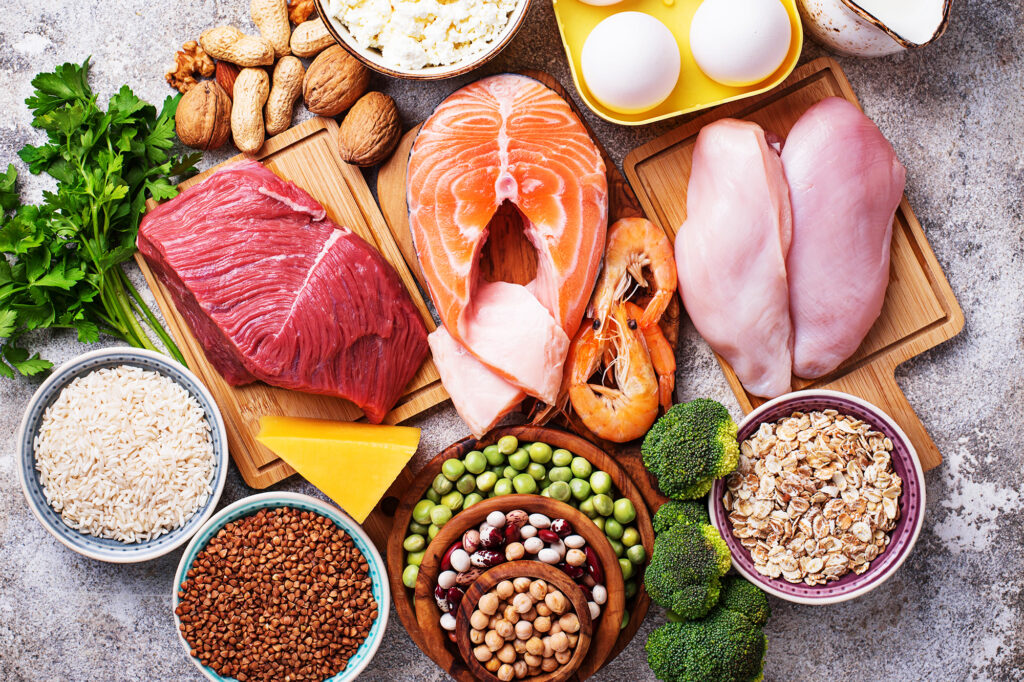News Blast: Your Daily Update
Stay informed with the latest news and trends.
Protein Paradise: Your Ticket to a Tasty Transformation
Discover delicious protein-packed recipes and tips to transform your meals and elevate your health in Protein Paradise!
Top 10 Protein-Rich Foods to Supercharge Your Diet
Incorporating protein-rich foods into your diet is essential for maintaining muscle mass, boosting metabolism, and promoting overall health. Here are the top 10 protein-rich foods that can help you supercharge your diet:
- Chicken Breast: A lean source of protein, perfect for muscle building and repair.
- Quinoa: A complete plant protein that contains all nine essential amino acids.
- Greek Yogurt: Packed with protein and probiotics, great for gut health.
- Eggs: Versatile and nutrient-rich, eggs are a fantastic protein source.
- Lentils: A fantastic choice for vegetarians and vegans, packed with protein and fiber.
- Almonds: These nuts not only provide healthy fats but are also a good source of protein.
- Tofu: A soy-based protein that is perfect for plant-based diets.
- Fish: Particularly salmon, which is rich in omega-3 fatty acids and high in protein.
- Cottage Cheese: Low in fat and high in casein protein, excellent for muscle recovery.
- Chickpeas: Versatile legumes that can be added to numerous dishes for an extra protein boost.
Including these protein-rich foods in your meals can significantly enhance your nutritional intake. Not only do they provide the necessary building blocks for your body, but they also help in reducing cravings, supporting weight management, and improving overall health. Try to diversify your protein sources to obtain a wide range of nutrients, and watch as your energy levels and muscle strength soar!

How to Incorporate More Protein into Every Meal
Incorporating more protein into your meals doesn't have to be a daunting task. Start by adding protein-rich foods to your existing recipes. For breakfast, consider adding a scoop of protein powder to your smoothies or opting for Greek yogurt instead of regular yogurt. During lunch and dinner, try including lean meats such as chicken, turkey, or fish and add legumes like lentils and beans to salads and grain dishes. A simple way to boost protein content is by substituting regular grains with quinoa or farro, which are not only nutritious but also high in protein.
Another effective strategy is to plan your meals around a protein source. Start each meal with a serving of protein and build around it. For example, make eggs the star of your brunch by whipping up a protein-packed vegetable omelet. Snacking can also contribute significantly to your daily intake; choose protein-dense snacks like nuts, cheese, or hummus with veggies. By ensuring that every meal contains a protein component, you'll not only feel fuller longer but also support muscle growth and recovery. The key is to think creatively about how to integrate these powerful nutrients into your daily routine!
The Science of Protein: Why It's Essential for Your Body and Fitness Goals
Protein is an essential macronutrient that plays a critical role in the growth and repair of tissues throughout the body. It is composed of amino acids, which are the building blocks needed for various bodily functions. Without adequate protein intake, your body may struggle to maintain muscle mass, leading to weakness and fatigue. Not only is protein vital for muscle repair after exercise, but it also supports immune function, hormone production, and the creation of enzymes. Incorporating high-quality protein sources into your diet, such as lean meats, fish, eggs, dairy, legumes, and nuts, can help you meet your body's needs and optimize your overall health.
In the context of fitness goals, protein is particularly important for anyone looking to build muscle or lose weight. Consuming protein can enhance muscle protein synthesis, making it a vital component of post-workout recovery. Numerous studies suggest that a higher protein intake may increase feelings of satiety, which can lead to reduced calorie consumption and support weight management goals. For those engaging in strength training, it is commonly recommended to consume approximately 1.6 to 2.2 grams of protein per kilogram of body weight per day. Prioritizing protein can not only help you achieve your fitness objectives but also improve your overall well-being.